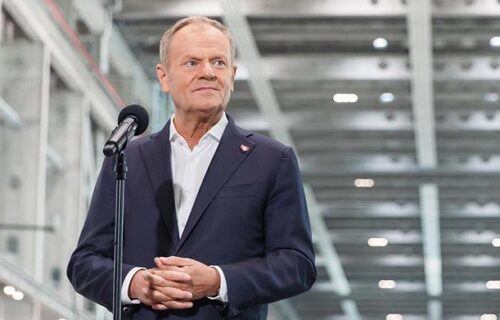Prime Minister Donald Tusk visited the soon-to-be-operational Baltic Towers facility in Gdańsk, set to become the largest and most advanced offshore wind tower factory in Europe. Production at the site is scheduled to begin next week, marking a significant step in Poland’s strategy to expand renewable energy and enhance national energy security. The investment is expected to create 500 specialized jobs and strengthen domestic manufacturing capabilities within the offshore wind supply chain.
Baltic Towers was established in 2023 as a joint venture between the Polish Industrial Development Agency (ARP) and Spain’s GRI Renewable Industries. This Polish-Spanish collaboration was designed to support the development of offshore wind energy in the Baltic Sea and position Poland as a leading player in the European wind sector. The factory is located on Ostrów Island in Gdańsk and will reach full production capacity by the end of November 2026, with the capability to produce over 150 wind turbine towers annually.
During the visit, Prime Minister Tusk emphasized the strategic importance of domestic involvement in such projects, stating that if Poland is to be a European leader in offshore energy, it must produce critical components locally. He highlighted the investment’s alignment with national interests, including energy affordability, technology development, and employment.
The project also reflects Poland’s growing presence in the global offshore wind sector. According to the Wind Industry Hub Foundation, Polish workers already account for 3% of the global offshore wind workforce. As the third-largest wind energy market in the EU, behind only Denmark and Germany, Poland benefits from favorable conditions such as steady wind speeds, shallow waters, low salinity, and minimal social or environmental conflict.
Baltic Towers’ CEO Jakub Wnuczyński noted that the offshore wind sector is highly demanding, and Poland’s ability to deliver key components locally enhances the resilience and independence of its supply chain. The new facility will reduce risks for offshore projects by securing domestic production of vital infrastructure.
Wojciech Balczun, President of ARP, stressed the importance of public-private cooperation in executing complex industrial projects. He expressed confidence in Poland’s capacity to support its economy through such strategic ventures, stating that the country possesses the tools needed to strengthen local industry and contribute to broader economic development.
Prime Minister Tusk also addressed broader security considerations, noting that the government will work to safeguard infrastructure investments, including military dimensions, amid rising concerns over potential sabotage activities in the Baltic region. His visit began with a stop at the Naval Operations Center in Gdynia, where he discussed security issues with defense officials, including monitoring activities near undersea energy cables connecting Poland and Sweden.
The Baltic Towers project is a milestone in the development of Poland’s offshore wind industry and illustrates the country’s growing ambition to secure a leadership position in the European energy transition.
